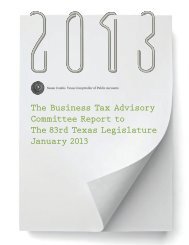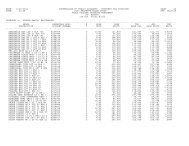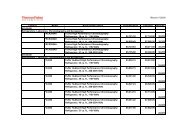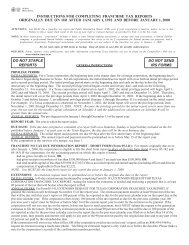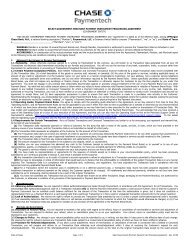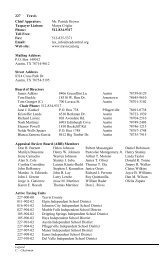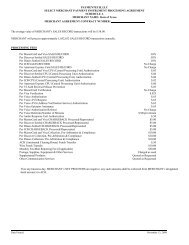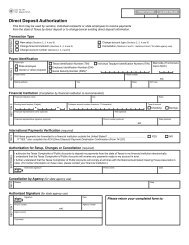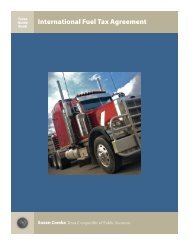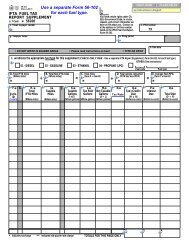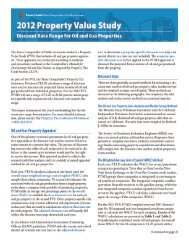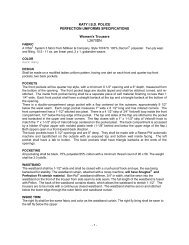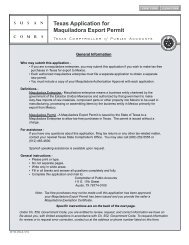Motor Vehicle Tax Guidebook 2011 - Texas Comptroller of Public ...
Motor Vehicle Tax Guidebook 2011 - Texas Comptroller of Public ...
Motor Vehicle Tax Guidebook 2011 - Texas Comptroller of Public ...
Create successful ePaper yourself
Turn your PDF publications into a flip-book with our unique Google optimized e-Paper software.
For a <strong>Motor</strong> <strong>Vehicle</strong> 25 Years Old or Older<br />
• Use a seller-signed bill <strong>of</strong> sale.<br />
• If a signed bill <strong>of</strong> sale is not available, then<br />
require an appraisal from a dealer, insurance<br />
adjuster or at the discretion <strong>of</strong> the county TAC,<br />
someone who would have special knowledge <strong>of</strong><br />
the vehicle’s value. Such a person may include<br />
an antique dealer or antique auction. The<br />
<strong>Comptroller</strong>’s appraisal form Form 14-128<br />
may be used, but is not required. In lieu <strong>of</strong> the<br />
appraisal, a title applicant who is obtaining a<br />
title through a bonded title process may use<br />
two-thirds <strong>of</strong> the bond amount (bond is for<br />
150 percent <strong>of</strong> vehicle value).<br />
Trade-Ins<br />
• Value Allowed<br />
• Multiple Trades<br />
• Split Trade-In Value<br />
• Trade-Down<br />
• <strong>Vehicle</strong> Sold to Lender at Conclusion <strong>of</strong> Balloon<br />
Note<br />
• Purchase <strong>of</strong> <strong>Vehicle</strong> Consigned to Dealer<br />
Value Allowed<br />
The purchaser may deduct from the selling price the<br />
value <strong>of</strong> a motor vehicle traded by the purchaser to the<br />
seller on the purchase <strong>of</strong> another motor vehicle. The<br />
eligible trade-in must be taken as part <strong>of</strong> the purchase<br />
transaction. The tax is computed on the remaining<br />
selling price for the purchased vehicle. For example, Jim<br />
purchases a $25,000 vehicle and trades in his $10,000<br />
vehicle. Jim owes tax on the $15,000 difference.<br />
The purchaser can take this deduction only by trading<br />
in a motor vehicle. Any other property, such as a boat,<br />
airplane, livestock, etc., that a seller takes in trade<br />
cannot be deducted from the selling price for motor<br />
vehicle tax purposes.<br />
The value <strong>of</strong> the motor vehicle trade-in is not the<br />
equity, but the value <strong>of</strong> the vehicle traded in.<br />
Be aware that SPV applies in a private-party purchase<br />
to determine the sales price to use for calculating the<br />
motor vehicle tax, but does not apply to determining<br />
the value <strong>of</strong> the trade-in vehicle.<br />
Multiple Trades<br />
A purchaser can trade in more than one motor vehicle<br />
on the purchase <strong>of</strong> another motor vehicle.<br />
The seller must describe the first trade-in in the trade-in<br />
block <strong>of</strong> the Form 130-U, Line 20. Block 20(a) is for<br />
noting additional trade-ins.<br />
Split Trade-In Value<br />
When a purchaser trades in a motor vehicle on the<br />
purchase <strong>of</strong> two or more motor vehicles from the<br />
same seller and the trade-in motor vehicle is greater in<br />
value than any single price <strong>of</strong> a motor vehicle being<br />
purchased, the trade-in value may be split among the<br />
purchases to allow full credit for the trade-in.<br />
The seller must show the trade-in description on each<br />
Form 130-U and reference the forms to each other to<br />
clarify the transaction. The seller must reference the tax<br />
receipts in the same manner.<br />
Trade-Down<br />
There is no tax due when a purchaser trades in a motor<br />
vehicle <strong>of</strong> greater value on a motor vehicle <strong>of</strong> lesser<br />
value, commonly referred to as a trade-down.<br />
For example, Sally purchases a $20,000 vehicle and<br />
trades in to the seller her $30,000 vehicle. Sally owes no<br />
motor vehicle sales tax on her trade-down <strong>of</strong> vehicles.<br />
<strong>Vehicle</strong> Sold to Lender at Conclusion <strong>of</strong><br />
Balloon Note<br />
Sometimes a borrower/purchaser will enter into a<br />
finance agreement where at the conclusion <strong>of</strong> the<br />
agreement there are three options available regarding<br />
the ownership <strong>of</strong> the motor vehicle. (1) The borrower/<br />
purchaser pays <strong>of</strong>f the balloon note and the borrower/<br />
purchaser retains the motor vehicle. (2) The borrower/<br />
purchaser refinances the vehicle and retains the vehicle.<br />
(3) The lender guarantees to purchase the vehicle from<br />
the borrower/purchaser.<br />
If a borrower/purchaser sells the motor vehicle to the<br />
lender (the third option) at the conclusion <strong>of</strong> a finance<br />
agreement, the borrower/purchaser cannot use that<br />
motor vehicle as a trade-in deduction in the purchase<br />
transaction <strong>of</strong> another motor vehicle. The borrower/<br />
purchaser is not directly trading the old motor vehicle<br />
for the purchase <strong>of</strong> a new motor vehicle to the new<br />
<strong>Motor</strong> <strong>Vehicle</strong> <strong>Tax</strong> <strong>Guidebook</strong><br />
III-27



